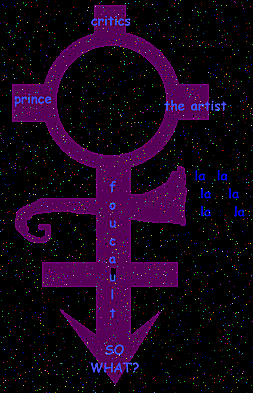

"Is it? That's your interpretation? Come where? Come to whom? Come for what?"
Q: Oh, come on!
(Laughs) "That's just the way you see it. It's in your mind."
This is the first subject he warms to: different perceptions. How one man's meat is another man's muesli. This, he explains, is why we can't label music, feelings, people. He says something convoluted like: everything is something else to everyone.
Early in his career, he claimed to be writing as a product of his environment:
I don't want people to get the impression that sex is all I write about. Because, it's not and
the reason why it's so abundant in my writing is mainly because of my age and the things
that are around me. Until you can go to college or get a 9 to 5 job, then there's going to be
a bunch of free time around you. And free time can only be spent in certain ways.
As  , he claims to not be as overtly sexual in his lyrics, leading one
reporter to claim:
, he claims to not be as overtly sexual in his lyrics, leading one
reporter to claim:
At first it seems an unlikely sentiment coming from the man who once wrote about
Throughout his career, Prince had fun with the image he knew to exist of him in popular
culture:
From "Bob George" on The Black Album: "Prince? That skinny mother fucker
with the high voice? Please."
From 12" version of "Kiss" (as the song fades out):
"oh my God, isn't that Prince on televion? Would you look at that?
Of course, the ultimate joke in his career seemed to be the release of the song "My name
is Prince!" on the album _ _ just before he announced his name
change. Since that change, he has continue to play with popular perceptions and
criticisms:
_ just before he announced his name
change. Since that change, he has continue to play with popular perceptions and
criticisms:
From "Now" on The Gold Experience: "Don't worry 'bout my name it's too long too remember
I could tell you now but we'd be here 'til next September"From "P Control" on The Gold Experience and in a different form on Crystal Ball:
"Good morning ladies and gentlemen
boys and mother fuckin' girls
this is your no-name captain
and I'm here to rock your worldFrom "Rippopgodazippa" on Crystal Ball"I just wanna call your name, but I don't know what 2 say'
Ripopgodazippa
If U're always with me
U'll never have 2 call me
Touché, touché
These several exerpts represent many more in the works of The Artist, and I contend that they are more than simply self referential. They contibute to the blurring distinctions between writer and the "I" in the texts where Foucault locates the author. They make the songs and the life necessarily bound in ways that force traditional classificatory processes to pause and account for more than simply what is "in the text" because the text extends, not only via personae and image, but via the connections between biographical events and fictional ones.